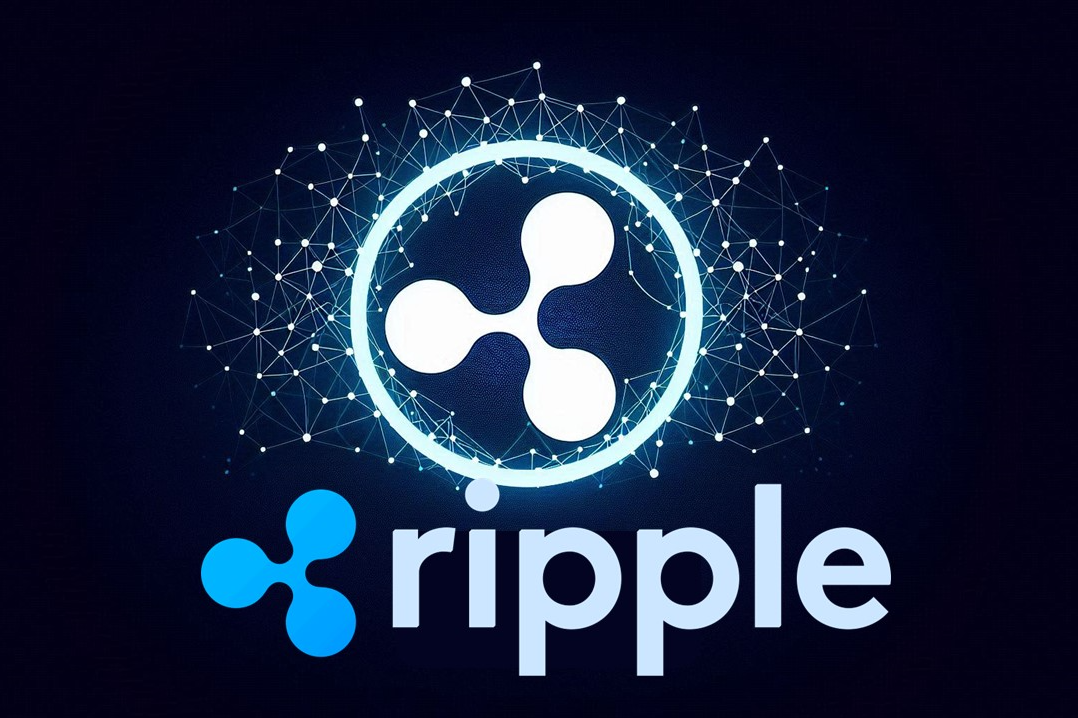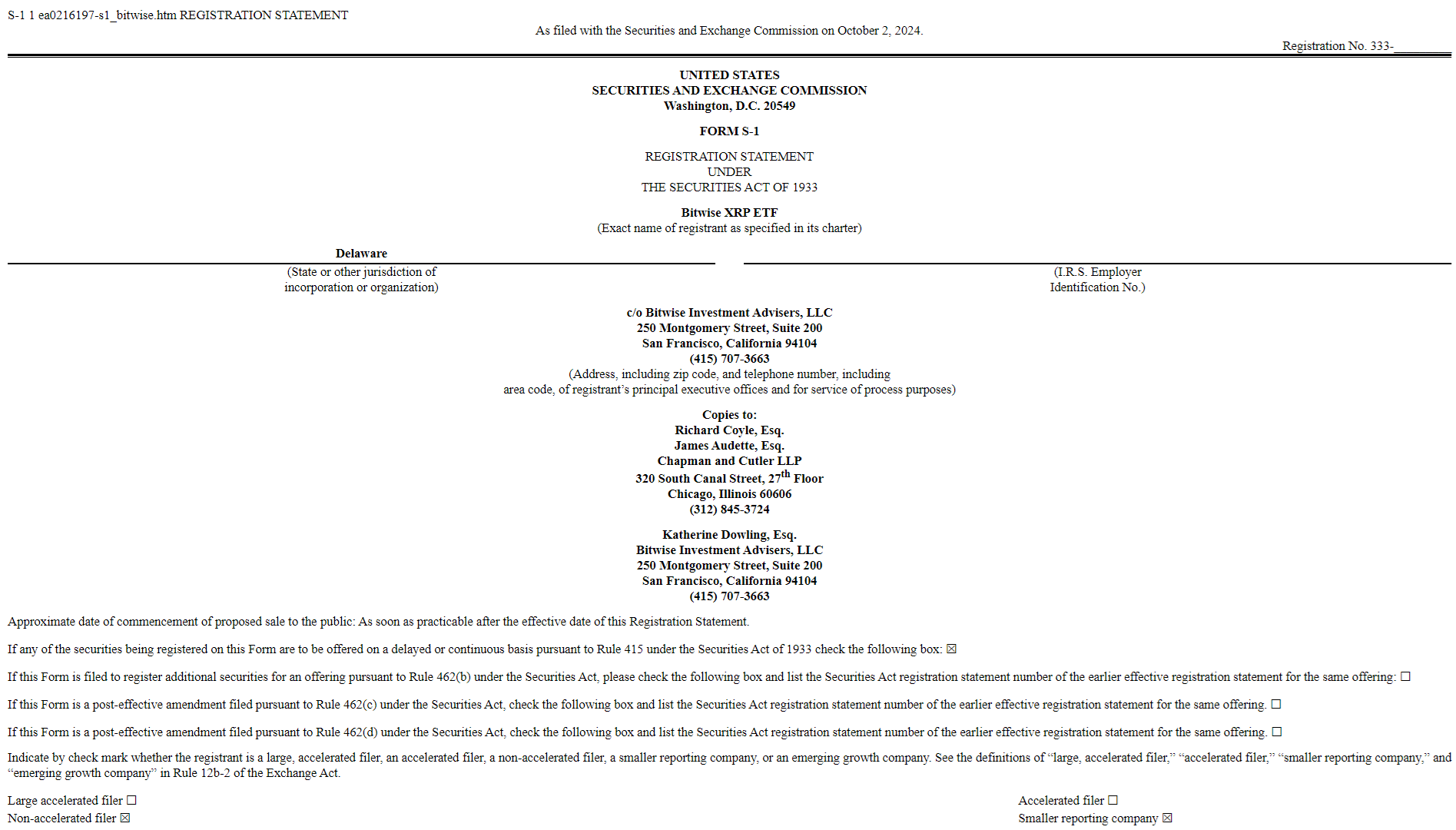2024-10-02


sec.gov/Archives/edgar/data/2039525/000121390024084334/ea0216197-s1_bitwise.htm
On October 2, 2024, Bitwise has filed a
registration statement with the U.S. Securities and Exchange Commission (SEC)
for a spot XRP exchange-traded fund (ETF). This move marks the first official
attempt to launch an ETF that tracks the daily price of XRP, the
seventh-largest cryptocurrency by market cap.
BNY will serve as the trust’s
administrator and Coinbase Custody Trust Company, LLC will be the
custodian for the spot XRP ETF.
This filing follows the recent approval
of spot Bitcoin and Ethereum ETFs as well as the submitted filing of Solana
ETFs, indicating a growing acceptance of cryptocurrency-based financial
products.
However, it’s important to note that
the approval process for such ETFs can be lengthy and uncertain.
SEC vs. Ripple case raises concern for XRP ETFs.
The case SEC vs. Ripple is a major
legal battle between the U.S. Securities and Exchange Commission (SEC) and
Ripple Labs, focusing on whether the cryptocurrency XRP should be classified as
a security under U.S. law.
Here is a detailed overview:
Background
Ripple Labs is the company behind XRP,
a cryptocurrency designed for fast cross-border payments.
The SEC filed a lawsuit against Ripple
Labs, its CEO Brad Garlinghouse, and co-founder Chris Larsen in December 2020.
The SEC alleges that Ripple raised $1.3
billion through the sale of XRP in an unregistered securities offering.
SEC’s Arguments
Unregistered Security Offering
The SEC claims that XRP should be
treated as a security, similar to stocks or bonds. Under this classification,
Ripple would have been required to register their sales with the SEC.
Investor Expectations
The SEC argued that Ripple's actions
led investors to believe they could profit from the efforts of Ripple Labs,
aligning XRP with the Howey Test. The Howey Test is used to determine if an
asset qualifies as an investment contract (security), requiring it to meet four
criteria: an investment of money, in a common enterprise, with an expectation
of profits, primarily from the efforts of others.
Centralized Control
The SEC emphasized that Ripple's
management had significant control over XRP's distribution and the network,
making it less decentralized compared to other cryptocurrencies like Bitcoin or
Ethereum.
Ripple's Defense
XRP as a Currency
Ripple argues that XRP is a digital
currency, similar to Bitcoin and Ethereum, which the SEC does not classify as
securities. Ripple maintains that XRP has utility as a bridge currency in
international payments, rather than serving as an investment vehicle.
Lack of Fair Notice
Ripple has argued that it did not
receive "fair notice" from the SEC that its conduct was in violation
of securities law. Ripple claims that for years, the SEC did not clearly define
XRP as a security, leading to confusion in the market.
Decentralization
Ripple also claims that XRP is
sufficiently decentralized, making it distinct from a traditional security.
They argue that many other entities and users use XRP independently, without
direction from Ripple Labs.
Partial Victory for Ripple
In July 2023, a U.S. District Judge
ruled that programmatic sales of XRP (those made on public exchanges) did not
constitute sales of securities, while institutional sales directly to investors
did.
This was seen as a partial win for
Ripple, with XRP classified as not a security when sold to the general public.
This led to a surge in XRP's value and several exchanges relisting XRP.
Current Status and Implications
Unsettled Issues
While Ripple won on some counts, the
SEC's arguments regarding institutional sales and direct offerings mean that
Ripple still has legal challenges. The mixed ruling also left ambiguities
around what constitutes a security in the crypto space.
The partial victory in July 2023 led to
many cryptocurrency exchanges relisting XRP, which they had previously delisted
after the SEC filed its lawsuit.
Affecting broader regulations; the
mixed ruling has generated significant discussion about the need for new
legislation to clarify how digital assets should be classified and regulated,
as the current framework of securities law doesn't align well with decentralized
technologies.
For the lastest update; on August 7,
2024, a federal judge ordered Ripple Labs to pay a
little over $125 million civil penalty in its ongoing legal battle with the
regulator. The SEC initially sought a nearly $2 billion penalty, while Ripple wants
the fine to be capped at $10 million.